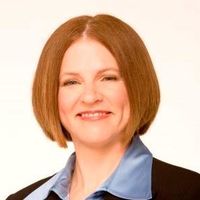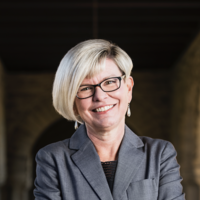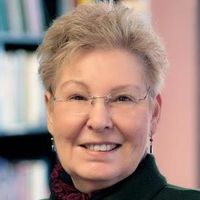1. The Future Workplace: Why Redesign Work?
About This Video
We can't have a 'one size fits all' workplace.
Increasingly, companies and institutions are realizing that the way we work needs to be redesigned in order to harness all the talent in the workplace and enhance competitive advantage. This video outlines four largescale changes affecting the future of work: 1) the changing composition of the workforce, 2) the changing nature of work itself, 3) the need for innovation and creativity to drive the economy and 4) advances in technology that affect where and how we work.
View The Future Workplace Resources
- Why You Hate Work: This op-ed examines the reasons why many workplaces today breed dissatisfied and unhappy workers, and suggests areas for improvement.
- Today's Employees No Longer Look Like Don Draper. So Why Is Work Designed for Him?: The "Mad Men" workplace is a thing of the past. O'Conner and Munsch explain why the future of work depends on eliminating this model.
- The Pay Gap Prescription: The "linear" pay model used by big-chain pharmacies has significantly closed the gender pay gap in that industry and shows promise for the future of work.
- Telework, Not Just for Moms and Millennials: Many think the future of work is "telework," or working from home. Research shows that this can also perpetuate gender bias, as we head towards a male-dominated teleworkforce.
- Daddy Track: The Case for Paternity Leave: Paternity leave has begun to enter coporate and mainstream cultures. Author Liza Mundy shows how adopting paternity leave enhances the future of work.
View The Future Workplace Biographies
Molly Anderson
PRESIDENT, EXPONENTIAL TALENT LLC
AUTHOR, THE CORPORATE LATTICE
CLAYMAN INSTITUTE ADVISORY COUNCIL MEMBER
EDUCATION MODULE INTERVIEWEE

Molly Anderson is president of Exponential Talent LLC which specializes in tapping the full performance power of today’s diverse workforce. She is also co-author of the best-seller “The Corporate Lattice: Achieving High Performance in the Changing World of Work.” Previously, Anderson was director of talent for Deloitte Services LP where she led transformative initiatives in the retention and advancement of women, leadership development and succession, performance management, Mass Career Customization®, and workplace flexibility. Anderson is an authority on organizational effectiveness, human resources strategy, and learning and development. She also serves on the Advisory Board for Stanford University’s Clayman Institute for Gender Research.
Anderson earned her MBA from the Stanford Graduate School of Business and her AB in Government from Harvard University.
Laura Carstensen
DIRECTOR OF THE STANFORD CENTER ON LONGEVITY
FAIRLEIGH S. DICKINSON JR. PROFESSOR IN PUBLIC POLICY
PROFESSOR OF PSYCHOLOGY
BARBARA D. FINBERG DIRECTOR, CLAYMAN INSTITUTE FOR GENDER RESEARCH, 1997-2001

Laura L. Carstensen is Professor of Psychologyat Stanford University where she is the Fairleigh S. Dickinson Jr. Professor in Public Policy and founding director of the Stanford Center on Longevity. She is best known for socioemotional selectivity theory, a life-span theory of motivation. For more than twenty years her research has been supported by the National Institute on Aging and she was honored with a MERIT award in 2005. Her most current empirical research focuses on ways in which motivational changes influence cognitive processing. Dr. Carstensen is a fellow in the Association for Psychological Science, the American Psychological Association and the Gerontological Society of America. She has chaired two studies for the National Academy of Sciences, resulting in noted reports The Aging Mind and When I’m 64. She is a member of the MacArthur Foundation’s Research Network on an Aging Society and serves on the National Advisory Council on Aging to NIA. Carstensen has won numerous awards, including the Kleemeier Award, The Kalish Award for Innovative Research and the Distinguished Mentorship Award from the Gerontological Society of America, as well as the Master Mentor Award from the American Psychological Association. She was selected as a Guggenheim Fellow in 2003. In 2011, she authored A Long Bright Future: Happiness, Health, and Financial Security in an Age of Increased Longevity. Carstensen received her B.S. from the University of Rochester and her Ph.D. in Clinical Psychology from West Virginia University. She holds an honorary doctorate from the Katholieke Universiteit Leuven, Belgium.
Shelley J. Correll
BARBARA D. FINBERG DIRECTOR, CLAYMAN INSTITUTE
PROFESSOR OF SOCIOLOGY, STANFORD UNIVERSITY
PROFESSOR, BY COURTESY, OF ORGANIZATIONAL BEHAVIOR, STANFORD GRADUATE SCHOOL OF BUSINESS
VOICE & INFLUENCE EDUCATION MODULE PRESENTER

Shelley Correll is professor of sociology and organizational behavior at Stanford University and the Barbara D. Finberg Director of the Clayman Institute for Gender Research. Her expertise is in the areas of gender, workplace dynamics and organizational culture. She has received numerous national awards for her research on the “motherhood penalty,” research that demonstrates how motherhood influences the workplace evaluations, pay and job opportunities of mothers. Professor Correll recently led a nationwide, interdisciplinary project on “redesigning work” that evaluates how workplaces structures and practices can reconfigured to be simultaneously more inclusive and more innovative. She is also studying how gender stereotypes and organizational practices affect the entry and retention of women in technical professions and how the growth of the craft beer industry affects the founding and success of women brewers. She is currently writing a book called Delivering on Diversity: Eliminating Bias and Spurring Innovation.
Martin N. Davidson
PROFESSOR OF LEADERSHIP AND ORGANIZATIONAL BEHAVIOR, DARDEN GRADUATE SCHOOL OF BUSINESS

Dr. Martin N. Davidson is Professor of Leadership and Organizational Behavior at the University of Virginia’s Darden Graduate School of Business. He teaches, researches, and consults with leaders in the Americas, Europe, Africa, and Asia on how they can use diversity strategically to generate superior business performance. His research appears in Administrative Science Quarterly, Harvard Business Review, Research on Negotiation in Organizations, and the International Journal of Conflict Management and several other journals and books. In his recent book, “The End of Diversity as We Know It: Why Diversity Efforts Fail and How Leveraging Difference Can Succeed,” Davidson introduces a research-driven paradigm for leaders frustrated or disillusioned with traditional ways of designing and implementing diversity initiatives.
Davidson teaches leadership in Darden’s highly regarded Executive Education and MBA programs, and consults with a host of Fortune 500 firms, government agencies, and non-profit organizations. He has served as the chair of the Gender and Diversity in Organizations Division of the Academy of Management, and has been featured in numerous media outlets including The New York Times, Business Week, The Wall Street Journal, The Washington Post, and National Public Radio. He earned his A.B. from Harvard University and his Ph.D. from Stanford University.
John L. Hennessy
PRESIDENT, STANFORD UNIVERSITY

John Hennessy is President of Stanford University. He joined Stanford’s faculty in 1977 as an Assistant Professor of Electrical Engineering. He rose through the academic ranks to full professorship in 1986 and was the inaugural Willard R. and Inez Kerr Bell Professor of Electrical Engineering and Computer Science from 1987 to 2004.
In 1999, he was named Provost, the university’s chief academic and financial officer. As Provost, he fostered interdisciplinary activities in the biosciences and bioengineering and oversaw improvements in faculty and staff compensation. In October 2000, he was inaugurated as Stanford University’s 10th president. In 2005, he became the inaugural holder of the Bing Presidential Professorship.
Lori Nishiura Mackenzie
EXECUTIVE DIRECTOR
FOUNDER, ONLINE VOICE & INFLUENCE PROGRAM
EXECUTIVE EDITOR, UPRISING AND GENDER NEWS

As Executive Director, Lori Nishiura Mackenzie leads the strategic direction and operations of the Institute, including finance, community relations, marketing, and program development. She is co-founder of the Institute's latest initiative, the Center for Women's Leadership. Mackenzie is creator of the workshops the Language of Leadership and the Dyanmics of Hyper-Effective Teams. She is founder of the online Voice & Influence program aimed at providing people with the skills, information and inspiration to be as effective as possible. This curriculum has been widely viewed through the Clayman Institute's partnership with LeanIn.org, the Stanford Graduate School of Business, the Darden Graduate School of Business and INSEAD.
Mackenzie frequently speaks about Women's Leadership and Seeing | Blocking Bias at leading companies and organizations. Conference presentations include Mt. St. Mary's Women's Leadership Conference, Girls Alliance Keynote, the MAKERS Conference, Professional Business Women of California, eBay WIN Summit, Cisco CTSO Women's Conference, Amelia Earhart Society, VMWorld, the Latina Coalition, HR People & Strategy Global Conference, and the Grace Hopper Celebration Technical Executive Forum. Company presentations include CA Technologies,Cisco, Deloitte, eBay, Genentech, General Mills, LinkedIn, Mozilla, RedHat, Schwab, Shearman & Sterling, State Street, and VMware.
Phyllis Moen
PROFESSOR OF SOCIOLOGY, UNIVERSITY OF MINNESOTA

Phyllis Moen holds a McKnight Presidential Endowed Chair and is Professor of Sociology at the University of Minnesota, arriving there in 2003 after twenty-five years as a professor at Cornell University where she held the Ferris Family Chair in Life Course Studies. She received her Ph.D. from the University of Minnesota in 1978. Professor Moen co-directs (with Erin Kelly) the Flexible Work and Well-Being Center (located in the Minnesota Population Center), part of a larger research network initiative supported by the National Institutes of Health and Centers for Disease Control to investigate workplace policy initiatives aimed at promoting individual and family health and life quality as well as positive business outcomes.
Moen has published numerous books and articles on careers, retirement, health, gender, policy and families as they intersect and as they play out over the life course. Her two most recent books are It’s About Time: Couples and Careers (2003) and The Career Mystique: Cracks in the American Dream (2005, with Pat Roehling), which won the 2005 Award for Excellence in Sociology from the Association of American Publishers’ Professional and Scholarly Publishing Division. Dr. Moen’s recent research is examining the effects of promoting flexibility and control over time on both older and younger women and men workers.
Professor Moen is currently on the board of SHiFT, a small non-profit in the Twin Cities focused on adults in transition. She has previously served on the board of Civic Ventures, a national non-for profit organization that generates ideas and programs to reframe and redefine the second half of life. Dr. Moen has also served as a member of the Conference Board’s Work-Life Leadership Council. She currently serves on the research advisory committee for the Center on Aging and Workplace Flexibility at Boston College. She has been elected as a fellow in the American Association for the Advancement of Science, the Gerontological Society of America, and the National Council of Family Relations. Dr. Moen is currently writing another book, Boomers on the Edge: Navigating the Risks and Promise of Encore Adulthood, to be published by Oxford University Press.
Sally Thornton
FOUNDER AND CHIEF CURATOR, FORSHAY
EDUCATION MODULE INTERVIEWEE
CLAYMAN INSTITUTE ADVISORY COUNCIL

Sally Thornton is the Founder and Chief Curator of Forshay, a new recruiting firm that provides resources on-demand. Previously, Thornton co-founded and ran Flexperience, a company that the San Francisco Business Times named a "Top 100 Fastest Growing Private Companies" in 2010. Thornton supports other female entrepreneurs through her leadership roles at Stanford University’s Clayman Institute for Gender Research, UC Hastings WorkLife Law Board, and as a Board of Advisor role at two start ups: RallyOn, Inc. and SkinnyScoop.com. Thornton is a guest lecturer at Stanford’s Graduate School of Business and UC Berkeley's Haas School of Business.
Thornton earned her BA in International Relations from University of Minnesota, Twin Cities.
Joan C. Williams
DISTINGUISHED PROFESSOR OF LAW, UC HASTINGS
FOUNDING DIRECTOR OF CENTER FOR WORKLIFE LAW
AUTHOR, WHAT WORKS FOR WOMEN AT WORK

Joan C. Williams has played a central role in reshaping the debates over women’s advancement for the past quarter-century. Described as having "something approaching rock star status” by The New York Times, Williams was awarded the American Bar Foundation's Outstanding Scholar Award (2012), the Elizabeth Hurlock Beckman Award (2012), the ABA’s Margaret Brent Award for Women Lawyers of Achievement (2006), and the Gustavus Myers Outstanding Book Award for Unbending Gender: Why Family and Work Conflict and What to Do About It (Oxford University Press, 2000). In recognition of her interdisciplinary work, Williams gave the 2008 Massey Lectures in American Civilization at Harvard University, delivered in prior years by (among others) Eudora Welty, Gore Vidal and Toni Morrison.
Williams, who is Distinguished Professor of Law and Hastings Foundation Chair at University of California, Hastings College of the Law, has authored or co-authored seven books. She has written over seventy law review articles, including one listed in 1996 as one of the most cited law review articles ever written. Her work has been excerpted in casebooks on six different topics.
As Founding Director of WorkLife Law (WLL), Williams has played a leading role in documenting workplace bias against mothers, leadng to the Equal Employment Opportunity Commission’s 2007 Guidance on Caregiver Discrimination. Her article “Beyond the Maternal Wall: Relief for Family Caregivers Who Are Discriminated Against on the Job,” 26 Harvard Women’s Law Review 77 (2003)(co-authored with Nancy Segal), was prominently cited in the landmark case, Back v. Hastings on Hudson Union Free School District, 365 F.3d 107 (2d Cir. 2004). Williams has organized social scientists to document workplace bias against mothers, notably in a 2004 special issue of the Journal of Social Issues titled “The Maternal Wall” (co-edited with Monica Biernat and Faye Crosby), which received the Distinguished Publication Award of the Association for Women in Psychology.
Williams also has played a central role in documenting how work-family conflict affects working-class families, through reports such as “One Sick Child Away From Being Fired” (2006), “Three Faces of Work-Family Conflict” (2010) (co-authored by Heather Boushey of the Center for American Progress), and “Improving Work-Life Fit in Hourly Jobs” (2011). Williams’ current research focuses on how work-family conflict differs at different class locations; on the "culture wars" as class conflict; on how gender bias differs by race; and on the role of gender pressures on men in creating work-family conflict and gender inequality.
View The Future Workplace References
Share Price Reactions to Work Family Initiatives: An Institutional Perspective
Arthur, Michelle M. 2003. "Share Price Reactions to Work Family Initiatives: An Institutional Perspective." Academy of Management Journal 46(4): 497-505.
The New Male Mystique. Families & Work Institute
Aumann, Kersten, Ellen Galinsky, and Kenneth Matos. 2011. “The New Male Mystique. Families & Work Institute.” Retrieved June 10, 2014 (http://familiesandwork.org/downloads/NewMaleMystique.pdf
The Elder Care Study: Everyday Realities and Wishes for Change. Families & Work Institute
Aumann, Kersten, Ellen Galinsky, Kelly Sakai, Melissa Brown, and James T. Bond. 2010. “The Elder Care Study: Everyday Realities and Wishes for Change. Families & Work Institute.” Retrieved June 10, 2014 (http://familiesandwork.org/downloads/TheElderCareStudy.pdf).
The Changing Rhythms of American Family Life
Bianchi, Suzanne, M., John P. Robinson, and Melissa M. Milke. 2006. The Changing Rhythms of American Family Life. New York, NY: Russell Sage Foundation.
Family Change and Time Allocation in American Families.
Bianchi, Suzanne M. 2011. "Family Change and Time Allocation in American Families." The ANNALS of the American Academy of Political and Social Science 638(1): 21-44
Competing Devotions: Career and Family Among Women Executives
Blair-Loy, Mary. 2003. Competing Devotions: Career and Family Among Women Executives. Cambridge, MA: Harvard University Press.
Reinforcing Separate Spheres: The Effect of Spousal Overwork on the Employment of Men and Women in Dual-Earner Households
Cha, Youngjoo. 2010. "Reinforcing Separate Spheres: The Effect of Spousal Overwork on the Employment of Men and Women in Dual-Earner Households." American Sociological Review 75(2): 303–329.
Being the 'Go-To Guy': Fatherhood, Masculinity, and the Organization of Work in the Silicon Valley
Cooper, Marianne. 2000. "Being the 'Go-To Guy': Fatherhood, Masculinity, and the Organization of Work in the Silicon Valley." Qualitative Sociology 23(4): 379–405.
The Cultural Contradictions of Motherhood
Hays, Sharon. 1998. The Cultural Contradictions of Motherhood. New Haven, CT: Yale University Press.
Rethinking the ClockWork of Work: Why Schedule Control May Pay Off at Work and Home
Kelly, Erin L. and Phyllis Moen. 2007. "Rethinking the ClockWork of Work: Why Schedule Control May Pay Off at Work and Home." Advancements in Developing Human Resources 9(4): 487-506.
Are Communications about Work Outside Regular Working Hours Associated With Work-to-Family Conflict, Psychological Distress and Sleep Problems?
Schieman, Scott and Marisa C. Young. 2013. "Are Communications about Work Outside Regular Working Hours Associated With Work-to-Family Conflict, Psychological Distress and Sleep Problems?" Work & Stress 27(3): 244-261
Having it All' No Longer: Fertility, Female Labor Supply, and the New Life Choices of Generation X
Vere, James Patrick. 2007. "'Having it All' No Longer: Fertility, Female Labor Supply, and the New Life Choices of Generation X." Demography 44(4): 821-828.